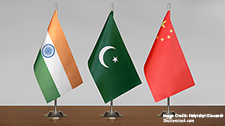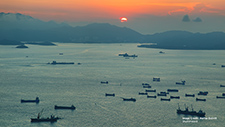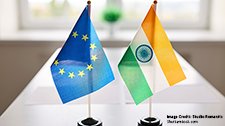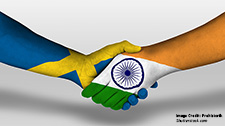Stockholm Center for South Asian and Indo-Pacific Affairs

The Stockholm Center for South Asian and Indo-Pacific Affairs (SCSA-IPA) at ISDP is a dedicated hub for research, dialogue, and policy exchange on South Asia and the wider Indo-Pacific. The Center examines the region’s evolving strategic, political, and security dynamics, with a special focus on South Asia’s role in shaping Indo-Pacific affairs. By fostering academic reflection and policy-oriented debate, SCSA-IPA provides insights that connect Nordic and European perspectives with key partners across the Indo-Pacific.
To put it directly, the SCSA-IPA studies how authoritarian powers pursue unilateral and non-democratic strategies in the Indo-Pacific, while promoting knowledge, awareness, and policy inputs for Nordic and European stakeholders. Its work aims to strengthen Europe’s engagement with India, Japan, Australia, ASEAN, and other Indo-Pacific partners.
Dialogue & Exchanges
The Center organizes regular seminars, conferences, and webinars in collaboration with leading think tanks, universities, and policy institutions across South Asia and the Indo-Pacific. These dialogues provide a platform for constructive debate on strategic issues. They also ensure that the European perspectives are engaged with regional developments in real time.
Delegations
Each year, the SCSA-IPA hosts South Asian scholars, representatives, and delegations in Stockholm, offering opportunities to engage with Nordic academics, officials, and entrepreneurs. At the same time, it facilitates Nordic delegations to South Asia, deepening mutual understanding. These exchanges help build long-term policy and academic networks across regions.
Visiting Fellows
The Center runs a visiting fellow program for young and senior scholars from South Asia to spend time at ISDP. During their stay, fellows actively contribute to the Center’s activities and publish research through ISDP formats. This program strengthens scholarly collaboration while amplifying voices from South Asia in European policy debates.
Annual Conference
The SCSA-IPA convenes an annual high-level conference on South Asian and Indo-Pacific affairs, alternately hosted in Stockholm and South Asia. This flagship event brings together policymakers, diplomats, academics, and experts for in-depth exchanges. It serves as a trusted platform for cross-regional deliberations on critical security and strategic issues.
Outreach
Throughout the year, the Center disseminates its findings through webinars, publications, and online platforms. These initiatives make specialized knowledge accessible to broader audiences in both Europe and South Asia. By engaging the public and stakeholders digitally, the Center ensures its research contributes directly to ongoing policy conversations.
Current Research Projects and Themes
Himalayan Security: Research investigates the instability and vulnerabilities of the Himalayan region, where climate change, border disputes, and unilateral strategies intersect. Particular attention is given to China’s policies and their implications for smaller Himalayan states, as well as for India’s security outlook. This theme also connects the Himalayan challenges with the broader Indian Ocean Region, highlighting the strategic continuity between continental and maritime spheres.
Authoritarian Powers & the EU: The Center studies how China and Russia are expanding their influence in South Asia and the Indo-Pacific through economic, political, and security channels. It explores how these authoritarian strategies challenge regional stability and Europe’s long-term interests. The research contextualizes these dynamics within Europe’s engagement strategies, highlighting ways to strengthen partnerships with India, Japan, Australia, and other Indo-Pacific actors.
NATO & the Indo-Pacific: This theme examines how NATO is incrementally engaging with the Indo-Pacific, a region increasingly central to global security. The focus is on building dialogue and cooperation with key partners such as India, Japan, Australia, South Korea, and ASEAN members like the Philippines, Indonesia, and Vietnam. Research also assesses NATO’s potential role in connecting with regional groupings, including the QUAD and ASEAN frameworks.
Defending the Liberal International Order: The Center explores how revisionist powers and unilateral policies are reshaping the rules-based global order. It studies the impact of U.S. tariff measures under Donald Trump, China’s revisionist behavior, and the deepening China-Russia partnership on global governance. The goal is to identify how Europe, together with Indo-Pacific partners, can safeguard the liberal international order from erosion.
Newsletter: India-Sweden Strategic Compass
The Center publishes a bi-monthly newsletter, the India–Sweden Strategic Compass, which highlights Sweden–India relations, Nordic–India engagement, EU–India dynamics, and broader Indo-Pacific developments.




